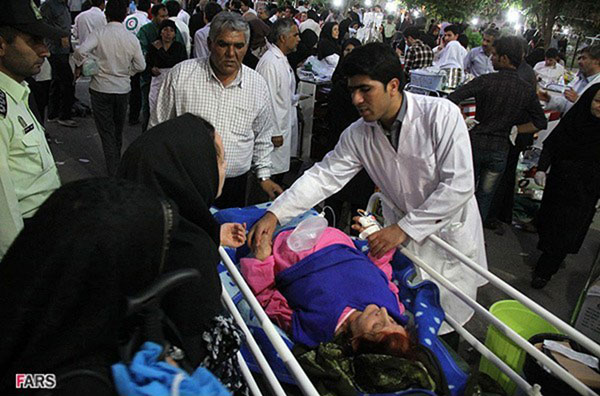
 |
|
An injured person is taken to hospital in Ahar, Iran August 11, 2012. [Photo/Agencies] |
The earthquakes struck in East Azerbaijan province, a mountainous region that neighbours Azerbaijan and Armenia to the north and is predominantly populated by ethnic Azeris - a significant minority in Iran.
Its capital, Tabriz, is a major city and trading hub far from Iran's oil-producing areas and known nuclear facilities. Buildings there are substantially built and the Iranian Students' News Agency said nobody in the city had been killed or hurt.
Homes and business premises in Iranian villages, however, are often made of concrete blocks or mud brick that can crumble and collapse in a strong quake.
Hospitals in Tabriz took in many of the injured from the surrounding villages, and city residents left their homes and crowded the streets following the two quakes, residents said.
"We were in our home on the sixth floor when the earthquake struck," said Massood, a Tabriz resident who spoke to Reuters by phone. "It took a very long time. For about 40, 45 seconds everything was shaking and we were ready for the building to collapse, but nothing happened."
His family was leaving their home and was in the stairwell when the second earthquake struck, Massood said. Ambulances were crowding a major Tabriz hospital from about midnight onward, he said, and a sizeable aftershock around 3 am local time brought people out of their homes again.
"I was just on the phone talking to my mother when she said, 'There's just been an earthquake', then the line was cut," one woman from Tabriz, who lives outside Iran, wrote on Facebook.
"God, what has happened? After that I couldn't get through. God has also given me a slap, and it was very hard."
Red Crescent official Mahmoud Mozafar was quoted by Mehr news agency as saying about 16,000 people in the quake-hit area had been given emergency shelter.
Iranian health minister Marzieh Vahid Dastejerdi said the government had despatched 48 ambulances and 500 blood bags to the worst affected areas, IRNA reported.
Officials said distribution of emergency shelter was ongoing and a field hospital was being set up in Varzaghan on Sunday to treat the injured.
Fars quoted Iranian lawmaker Abbas Falahi as saying he believed rescue workers had not yet been able to reach between 10 and 20 villages. Falahi said people in the region were in need of bread, tents and drinking water.
A local provincial official warned of more aftershocks over the next 48 hours and urged people in the area to stay outdoors.
The Turkish Red Crescent said it was sending a truck full of emergency supplies to the border. Turkey's Foreign Ministry said it had informed Iran it was ready to help.